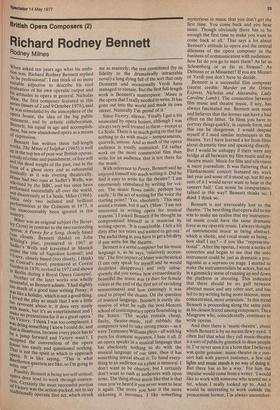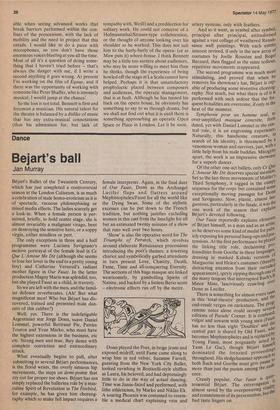British Opera Composers (2)
Richard Rodney Bennett
Rodney Milnes
When asked ten years ago what his ambit,i°11 was, Richard Rodney Bennett replied to be professional'. I can think of no more suitable adjective to describe his cool evaluation of his own operatic output and his attitudes to opera in general. Nicholas Maw, the first composer featured in this series (issues of 2 and 9 October 1976), said he Was stimulated by the atmosphere of the
opera f the id
the e ea o big public statement and by artistic collaboration. Bennett, his equal in age and accomplish
in, has now abandoned opera as a means of expression. Bennett has written three full-length works. The Mines of Sulphur (1965) is well up in the top ten of post-war British operas: a Study of crime and punishment, of free will and the dead weight of the past, cast in the formof a ghost story and as substantial
as it was riveting theatrically. Mines had two runs at Sadler's Wells, was televised by the BBC, and has since been Performed successfully all over the world, and disastrously at La Scala, Milan (1966). Since only two isolated and brilliant performances at the Coliseum in 1973, it nas unaccountably been ignored in this country. , Mines was an original subject (by Bever'eY Cross) in contrast to the two succeeding ,°Peras: A Penny for a Song, closely based kwtoo closely, Bennett thinks) on John hiting's play, premiered in 1967 at Qadler's Wells and travestied in Munich uvnder the title of Napoleon kornme; and nict°rY, closely based (too closely, I think)
Conrad's novel, premiered at Covent
arden in 1970, revived in 1972 and shown in Berlin during a Royal Opera Gastspiel. s Neither of the later works was wholly tuccessful, as Bennett admits. 'I had slightly woo much of a good time writing Penny; it like a holiday, which is not a good thing. ! loved the play so much that I was a little L__09 reverent about it; it does very nicely With music, but it's an entertainment and I _make no pretentions for it as a great opera.' Yn Victory: 'I think I was too complacent. I Was doing something I knew I could do, and iti,lat is disastrous, because every piece has to ,e a jump forward and Victory wasn't. I "'recepted the conventions of the opera n_Ouse too easily and questioned nothing.
at is not the spirit in which to approach !Per& It is like saying, "This is what Beethoven quartets are like, so I'm going to write one".'
Possibly Bennett is being too self-critical; ?pera does tend to work through conven`07n .. Certainly the most successful portion Victory was the action-packed, not to say c+aditionally operatic first act, which struck
me as maiterly; the rest constituted (by its fidelity to the dramatically intractable novel) a long dying fall of the sort that only Donizetti and occasionally Verdi have managed to sustain. But the first full-length work is Bennetf s masterpiece: 'Mines is the opera that I really needed to write. It has gone out into the world and made its own career. Naturally I'm proud of it.' Since Victory, silence. 'Finally I got a bit nauseated by opera houses, although I was "always very well treated in them — except at La Scala. There is so much going on that has nothing to do with music — temperaments, quarrels, unions. And so much of the opera audience is totally unmusical. I'd rather work on the most commercial film than write for an audience that is not there for the music.'
With reference to Penny, Bennett said he enjoyed himself too much writing it. Did he find it easy to write for the theatre? 'I am enormously stimulated by writing for voices. The music flows easily, perhaps too easily.' Is the act of writing for the voice the starting point? 'Yes, absolutely.' This may sound a truism, but it isn't. (Maw: 'I am not interested in writing opera for musical reasons.') I asked Bennett if he thought he compromised himself as a musician by writing operas. 'It is conceivable. I felt a bit dirty after ten years and wanted to get out.' The awful thing is, you have to get a bit dirty if you write for the theatre.
Bennett is a serial composer but his music language is, as he says, 'relatively accessible'. The first impact of Mines was theatrical (I can only speak for myself and he would doubtless disapprove) and only subsequently did you notice how extraordinarily beautiful the Music was (a duet for female voices at the end of the first act of ravishing sensuousness) and how cunningly it was used to propel the drama. On the question of musical langauge, Bennett is curtly dismissive of what he calls the post-Menotti school of contemporary opera flourishing in the States. 'The works contain cheap, flashy, theatre-music, real rubbish; the composers tend to take strong pieces — as it were Tennessee Williams plays— all with big parts for dramatic sopranos. I hate it all. If an opera speaks in a musical language that has absolutely nothing to do with the musical language of our time, then it has something unreal about it. To hand everything to an audience on a plate is immoral. I don't want to be obscure, but I certainly don't want to rush at audiences with open arms. The thing about music like that is that once you've heard it you never want to hear it again. The more you hear it the more sickening it becomes I like something
mysterious in music that you don't get the first time. You come back and you hear more. Though obviously there has to be enough the first time to make you want to come back at all.' That says a lot about Bennett's attitude to opera and the central dilemma of the opera composer in the business of communication with audiences: how far do you go to meet them? As far as Schoenberg or as far as Strauss? As Debussy or as Massenet? If you are Mozart or Verdi you don't have to decide.
Bennett is a successful film composer (recent credits: Murder on the Orient Express, Nicholas and Alexandra, Lady Caroline Lamb). The connection between film music and theatre music, if any, has always fascinated me. Bennett sees none and believes that the former can have a bad effect on the latter. 'In films you have to portray things quickly, in capsule form, and this can be dangerous. I would despise myself if I used similar techniques in the theatre. Yet I have learned a lot from films about dramatic time and speaking directly. But I would be unhappy if there were any bridge at all between my film music and my theatre music. Music for film and television is mere journalism. It was flattering that a Filmharmonic concert featured my work last year and some of it stood up, but 80 per cent of it I would never want to hear in the concert hall.' Can music be compartmentalised in this way? Bennett thinks so; I think I think so.
Bennett. is not irrevocably lost to the theatre. 'The best thing that opera did to me was to make me realise that my instrumental music could have the same dramatic force as my operatic music. I always thought of instrumental music as being abstract, which is idiotic, and vocal music as being — how shall I say? — if you like "representational". After the operas, I wrote a series of concertos and began to see that the solo instrument could be just as dramatic a protagonist as a soprano on stage. I started to make the instrumentalists be actors, but not in a gimmicky sense of running up and down the platform or shouting. This indicated that there should be no gulf between abstract music and any other sort, and has led to my writing being more intense, more concentrated, more articulate.' In this trend Bennett is proceeding along the same path as his closest friend among composers, Thea Musgrave who, coincidentally, continues to write operas.
And then there is 'music-theatre', about which Bennett is by no means dewy-eyed. 'I often feel that what they call music-theatre is a sort of publicity gimmick to draw people in. I've never seen it in a form that I believed was quite genuine: music-theatre in a concert hall with pierrot costumes, a few old lights and music stands is no way of doing it. But there has to be a way.' For him the impulse would come from a writer. 'I would like to work with someone who scared me a bit, whom I really looked up to. And it would be interesting to work outside the proscenium format; I'm always uncomfort able when seeing advanced works that break barriers performed within the confines of the proscenium, with the lack of mobility and the need to project that this entails. I would like to do a piece with microphones, so you don't have those enormous voices blasting at you all the time. Most of all it's a question of doing something that I haven't tried before — that's always the danger with me, if I write a second anything it goes wrong. At present I'm working on the film of Equus, and if there was the opportunity of working with someone like Peter Shaffer, who is intensely musical, I would jump at the chance: So the loss is not total. Bennett is first and foremost a musician. His natural talent for the theatre is balanced by a dislike of music that has any extra-musical connotations (thus his admiration for, but lack of sympathy with, Weill) and a predilection for solitary work. He could not conceive of a Hofmannsthal/Strauss-type collaboration, or the thought of anyone looking over his .shoulder as he worked. This does not suit him to the hurly-burly of the opera(or as Maw puts it) whore-house. I think Bennett may be a little too austere about audiences, who may be more willing to meet him than he thinks, though the experience of being howled off the stage at La Scala cannot have helped. Perhaps it is that unsatisfactory prophylactic placed between composers and audiences, the operatic nianagement, that is at fault. Although he has turned his back on the opera house, he obviously has something to say to us through drama, but we shall not find out what it is until there is something approaching an operatic Open Space or Place in London. Let it be soon.



































 Previous page
Previous page